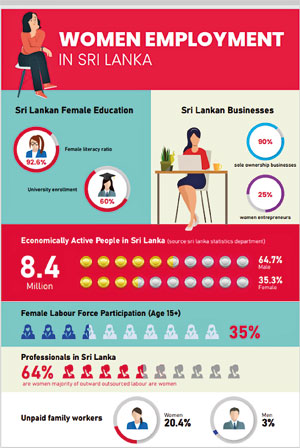NIBM Power Up the New Breed of Women Entrepreneurs in Sri Lanka
View(s): The number of women entrepreneurs is rapidly growing. Currently, over one third (1/3) of the entrepreneurial ventures in the world is run by women entrepreneurs. About 47% women started a business in 2020 in comparison to 44% of men (Jenifer Kaudil, W.E.S ,2021). About 252 million women around the world are entrepreneurs, and another 153 million women operate well-established businesses. Women launch more than 1200 new businesses every single day. 62% of women business owners are between 40 and 59 years old and around 80% of them have degrees or some other professional qualification.
The number of women entrepreneurs is rapidly growing. Currently, over one third (1/3) of the entrepreneurial ventures in the world is run by women entrepreneurs. About 47% women started a business in 2020 in comparison to 44% of men (Jenifer Kaudil, W.E.S ,2021). About 252 million women around the world are entrepreneurs, and another 153 million women operate well-established businesses. Women launch more than 1200 new businesses every single day. 62% of women business owners are between 40 and 59 years old and around 80% of them have degrees or some other professional qualification.
Moreover, the percentage of female entrepreneurs has increased by 114% over the last 20 years. In total, the population in South Asia is 1.749 billion out of which the percentage of female population is 48.37 in 2020. An estimated 61.3 million women entrepreneurs own and operate businesses in the ten ASEAN member countries, accounting for 9.8% of the total ASEAN population.
Indeed, female ownership is relatively high across the region: in 2015, the proportion of firms with female participation in ownership was 69% in the Philippines, 59% in Vietnam, and 43% in Indonesia. However, women in the ASEAN continue to face pivotal barriers in the processes of setting-up, management, and expansion of their businesses.
Women in Business in Sri Lanka
However, women’s participation in doing business in Sri Lanka is very much lower in comparison with the developed countries in the world. Female participation in the labor force was 40% in 2018. In contrast, it is interesting to note that Sri Lanka has achieved gender parity in access to education, and the majority of students who pursue higher education in Sri Lanka are students and their academic performance is also higher. Women entrepreneurs have been designated ‘the new engines for growth’ and ‘the rising stars of the economies in developing countries to bring prosperity and welfare, yet female entrepreneurship remains an ‘untapped source’ of economic growth and development (IPS and Oxfam International, 2014).
Although SMEs contribute about 45% of Sri Lanka’s gross domestic product (GDP) and provide half of the country’s jobs, only 25% of entrepreneurs are women in the SME sector (EDB, 2018).
 Women Entrepreneurship
Women Entrepreneurship
Any woman or group of women who innovates, initiates, or adopts an economic activity may be called women entrepreneurs. Women entrepreneurs are those women who think of a business enterprise, initiate, organise, and combine factors of production, operate the enterprise, and undertake risks and handle economic uncertainty involved in managing it. According to the Government of India, “women’s enterprise is the one owned and controlled by a woman having a minimum financial interest of 51% of the capital and giving at least a minimum 51% of generated employment to women”. The definition given by the government of India signifies the real commitment of women for doing business and their dedication towards engaging more women in the world of business.
Voice of Women Entrepreneurs in Sri Lanka
Women seek entrepreneurship for many reasons. While some women start a business because of an idea or innovation, employment experiences that have been unsatisfying, frustrating, with demanding and inflexible work environments, failure to break through the “glass ceiling” to reach higher-paid managerial positions etc., some others are compelled to start a business on their own due to forced unemployment, either from a layoff, or lack of managerial skills (Attygalle, 2014).
Women entrepreneurs have always been facing many constraints in Sri Lanka, and with COVID-19, things have aggravated and become more challenging. Upskilling women entrepreneurs with the knowledge and new skills in business management and technology through innovative programmes is of vital importance to motivate women in business to move them to the next level of growth. It is vital to create a conducive business environment for women in business to make them more productive and engaged. Some of the key voices of women in business include creating equal opportunities in doing business, better access to higher educational facilities in business management, financial facilities, spread of liberal and democratic culture, and recognition by the business community. Global research has found some of the major reasons as to why women become entrepreneurs.
- To become economically independent
- To establish their own enterprise
- To establish their identity in the society
- To achieve excellency in their endeavor
- To build confidence in themselves
- To develop risk assuming ability
- To claim equal status in the society
- To secure greater freedom and mobility
As an entrepreneur, a woman entrepreneur must perform all the functions involved in establishing an enterprise. These functions include idea generation and screening, determination of objectives, project preparation, project analysis, determination of forms of business organisation, completion of promotional formalities, raising funds, procuring men, machine and materials, and finally operation of business. As a result, women entrepreneurs will have to establish their businesses while exhibiting an array of qualities such as;
- Being accepting of challenges
- Ambitious
- Hard working
- Patience
- Being a motivator
- Adventurous
- Conscious
- Educated
- Intelligent
Entrepreneurship is an important driver of economic development and growth. Hence, NIBM has decided to launch an entrepreneurship programme at NIBM with the support of IIM, India.
Diploma in Women’s Entrepreneurship by NIBM in collaboration with IIM, India
The Indian Institute of Management Visakhapatnam (IIM-V) and the National Institute of Business Management signed a memorandum of understanding to deliver the Diploma in Women’s Entrepreneurship programme online. Diploma in Women’s Entrepreneurship is delivered by the faculty from the Indian Institute of Management (IIMV) using the NIBM Worldwide online learning platform. All lectures and assessments are set to run online. Therefore, there are no geographical barriers to study. This diploma certifies the ability to engage in entrepreneurship but may not come with a traditional college degree. This course may include one-on-one business coaching for existing or hypothetical businesses and lessons on pitching ideas, keeping accounts, branding, marketing, legal issues, and managing day-to-day business activities. There will be seminars where successful entrepreneurs share their experiences with the students.
The advantages of pursuing a diploma in Women Entrepreneurship include gaining real-world experiences and developing a business strategy for your first company. When the diploma programme is completed, you should be prepared to enter the world of entrepreneurship. Even if you do not instantly have an idea for a startup, the information and experience acquired here will prepare you to take leadership in the corporate sector. Moreover, the cost of a diploma in Women Entrepreneurship is considerably lower than the rate of the same programme offered in India. Students may also inquire about the financial help offered by major banks to continue with this programme.
NIBM Worldwide is an online learning platform created by NIBM in 2018. It is equipped with cutting-edge education technology and is used to educate students. It has a completely automated examination system that enables students to complete exams from home or from any location with an internet connection. Over 12,000 students are enrolled, and others have already finished their courses in the aftermath of the Covid 19 pandemic.
Dr. D M A Kulasooriya
Director General


